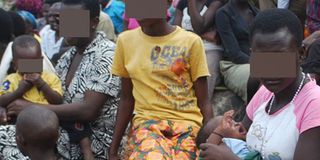Prime
Child marriages worry Dokolo leaders

Sensitisation. Some of the teenage mothers attend a sensitisation meeting against early marriages in Kapchorwa District, another district with rampant cases of child pregnancies, in 2016. FILE PHOTO
What you need to know:
- Reason. This has mainly been attributed to early marriages and teenage pregnancies.
- The Uganda Demographic and Health Survey, 2016 showed that teenage pregnancy rate in northern Uganda was at 145 per 1000 girls. The survey summarised that about 61 per cent of Ugandan children below the age of 18 years had been married or were living in some form of union.
DOKOLO. Authorities in Dokolo District are battling early child marriages and pregnancies, which they say have significantly contributed to the high school dropout rate.
About 55 per cent of girls dropped out of school in Agwata and Kwera sub-counties in 2018 due to early marriages and teenage pregnancies, according to a study commissioned by the education and community department.
The head teacher of Acoto Primary School in Agwata Sub-county, Mr Felix Adar, on Tuesday said only 37 girls of 56 enrolled at the school this year were present that day.
The study also shows that at least 30 girls dropped out at Acoto Primary School before reaching Primary Seven.
However, the future of the girl-child is grim because when they get pregnant, they are demoralised.
“There is nothing much we can do since it is very difficult to deal with the community,” Mr Adar said.
Acknowledgement
The Dokolo District chairman, Mr Frederick Odongo, acknowledged that many girls are dropping out of school in Agwata and Kwera sub-counties mainly due to early marriages and pregnancy.
He said the district is working with a development partner to fight the vice.
Mr Odongo noted that it is also the responsibility of parents and local government to ensure that girls complete the education cycle without any hindrance.
Ms Beatrice Abang, the former LC5 vice chairperson, said the lack of interest, pregnancy, early marriages, hidden costs at school, and family responsibilities have driven hundreds out of school.
“Parents don’t have money and so, when a child is sent back over tuition, that is the end of that child’s education,” she said.
The Dokolo District police commander, Mr Jimton Aguta, said the cases of early marriages could be rampant at the local level because sometimes parents connive and conceal the information.
“When we have the information, we bring the suspects to book and prosecute them. Where parents connive, it becomes very difficult for police to detect. The most important thing is to engage the members of the public so that they report such cases to police,” he said.
Mr Aguta said a large number of suspects have been jailed at Koroto government prison in Dokolo as the law takes course on the offenders.
The Dokolo District Woman Member of Parliament, Ms Cecilia Ogwal, recently gave out cash reward and mattresses to Primary Leaving Examinations (PLE) stars in the district in a bid to inspire girls to take education seriously.
Research findings
Although early marriages and pregnancy are often linked to school dropout, evidence to prove a direct and causal link to it is limited, according to researchers.
Ms Jenny Birchall, an independent researcher and consultant, says this is because early marriage and pregnancy can be both the cause and consequence of dropping out of school.
Girls certainly leave or are taken out of school because they are pregnant or married, but girls who have already dropped out of school are more likely to marry and/or become pregnant.
Evidence is readily available on policies that exclude pregnant students from school and those that support new mothers’ re-entry into school in Africa, Ms Birchall said in her research report.
The law, statistics
At least 26 countries in the African Union have some type of law, policy or strategy in place to guarantee girls’ rights to education during or after pregnancy.
In a minority of countries, there are policies or laws that explicitly allow pregnant students and new mothers to be excluded from school (Martinez and Odhiambo, 2018).
The latest edition of the Global Education Digest reveals that Africa has the world’s highest drop-out rate.
About 42 per cent of African school children will leave school early, with about one in six leaving before Grade 2.
Dropout rates are highest in Chad (72 per cent), Uganda (68 per cent) and Angola (68 per cent), where more than two of three children starting primary school are expected to leave before reaching the last grade. In contrast, dropout rates are lowest in Mauritius (2 per cent) and Botswana (7 per cent).
According to the United Nations Educational, Scientific and Cultural Organisation (UNESCO), the rate of dropout in Uganda shoots up to claim roughly half the class before the girls finish primary school.
The Uganda Demographic and Health Survey, 2016 showed that teenage pregnancy rate in northern Uganda was at 145 per 1000 girls. The survey summarised that about 61 per cent of Ugandan children below the age of 18 years had been married or were living in some form of union.



